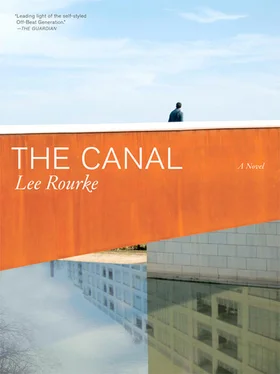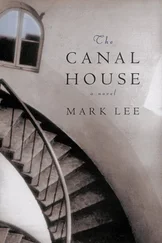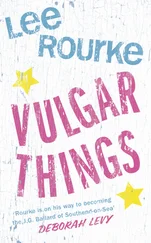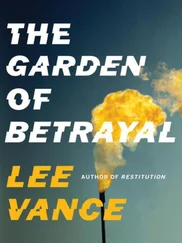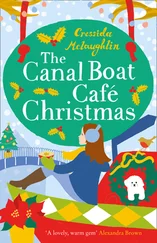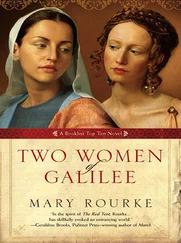She was looking out over the canal, her back turned to the Rosemary Branch, out towards Hoxton and the City, farther out towards the Swiss Re building, Tower 42, and the newer skeletal structures in progress appearing here and there — newer buildings about to tower over the London skyline en masse, continuing its progress, an unremitting vista of cranes and building sites, scaffolding and pollution, sprawled in all its vulgarity, ugliness, and beauty before her.
I stopped and waited for her to walk across the road and take the steps down to the canal. She seemed to be frozen, as if every atom within her had stopped sparking. The traffic trundled by in both directions between us, a line of cars in one direction, some cyclists and a number 76 bus in the other. Behind her, to her left, stood the old Gainsborough Studios where Hitchcock had made a few of his films. The whole building was now expensive flats, though in the courtyard lies an impressive sculpture of him in honour. I raised my eyes up above her and looked at the top row of flats. In the end flat, over-looking the canal, I could see a man and a woman standing on their balcony, They were facing each other, both, it seemed, wearing white bath robes. The woman was gesticulating frantically; the man was quite passive. They were both completely unaware that they could be seen. The man held his head to his hands after a short while and then lurched forwards, placing each hand on her shoulders, hoping to calm her down it seemed, but this action only served to enrage her further. She stepped back and ran into the flat, out of view. She was screaming at him, I could catch it briefly during the short breaks in the traffic. Then she ran back out onto the balcony; she was still screaming and gesticulating wildly. The man had now sat down at the table and chairs they had up there, so all I could see was her: her arms, windmill-like, flailing, forming a circular mass around her body. Then she stopped. She pointed towards him and stopped screaming. He suddenly rose to his feet, becoming visible to me again. He stepped towards her and attempted to embrace her again. She pulled away, back into their expensive flat, leaving him there. He leant over the balcony, resting on his elbows, his head in his hands again, staring down to the canal below.
When I looked back she had gone. At first I panicked, my heart skipping a number of beats. I swallowed my breath and looked for her about the road frantically. Then it hit me again: she was going back there to see him, to watch him. She was going back to the canal, like I always knew she would.
I’ve often thought that we seek reality in places and not in ourselves. These places can be anywhere we like them to be: a desert island, the beach, a nightclub, in the arms of a lover in a far-off land, rock climbing, up in the clouds, down in the depths of the deepest ocean, in space — ultimately in space. These places, this space, can be anything we want it to be. We need things, extra things that help us to make sense of it all; we need the space where things can happen, where these spaces can become a thing — it is only at that point, when space becomes a thing to us, that we truly feel real.
The thing is: I don’t feel real, and yet the space had become a thing to me — to us, I’d thought. That space that we had shared together, by the canal, the whitewashed office block, the rusting iron bridge and the coots, the Canada geese, and the swans … It all seemed such a long time ago now. Such a long time.
I walked down the steps and onto the towpath. I could see her up ahead, walking towards the bridge in the distance. She was walking quite slowly, but still with some kind of purpose. In the canal, to her immediate left, following alongside her were three or four coots; they were after food, thinking she had come to feed them. Up ahead, towards the bridge and the whitewashed office block, beyond that space, I could see the two swans resting by the far bank.
I honestly had no idea what I was going to say to her; I just knew that I was going to confront her, to ask her if anything she had told me was the truth. I wanted her to look me in the eye and simply tell me the truth. And then, once she had — and I hoped that she would — I would simply walk away and out of her life forever.
Memories are strange things; I don’t particularly understand them. I don’t understand why they appear, or where they return to. Memories were once real things, but I don’t understand what they are now. Still, it seems now they are all I have. All I have to fall back on, like a series of photographs.
I remember my mother saying something to me when I was a small child. I had been angry over the death of my grandmother. My mother comforted me after the funeral, in a small room at the back of my grandmother’s old house in Whitechapel. She said to me that nobody dies, because the deceased remain in the memory of the living. She said that that was all I had to think of whenever I became confused. I wanted to say to her then, right there in that small back room in Whitechapel, that even the living have to die — and that memories have to die with them. I wanted to tell her that nobody lives on forever. Well, they can’t. Of course, I never got around to saying this. I controlled my anger and returned to the large room where my family were seated on odd chairs, eating, drinking, and continuing this belief.
And now? All I have are my memories of this. And soon they will disappear with me, too.
I could feel the wind on my face. The murky water was choppy. I could see the dark clouds gathering for more rain above me, forming as if they had been purposely pushed there, the whole world a fiction. Above me, above her. The first droplets of the downpour — the greasy drizzle burgeoning into heavy globules — hit me as I returned my gaze to her, sheltering under the rusting iron bridge. It was a complete deluge. The rain bounced up from the towpath, back up into the atmosphere, back up my legs and trousers as I quickened my pace towards the bridge. Towards her.
She eventually looked up at me as I finally approached. She looked mawkish, and like she was sweating, but it was probably the rain. She was obviously embarrassed with herself. We stood next to each other without speaking. I listened to the rain. It was making a thunderous racket.
I felt like I was in a tent during a storm. I had always loved that feeling: the warmth and security of the waterproof canvas. I had always loved the sound of each individual droplet of water hitting the roof of the tent, one after the other, all at the same time, a cacophony of mini-aquatic explosions. I had always felt safe underneath the canvas when we camped in back gardens as children. I had always hoped for rain: nothing could touch me when it rained. The rain bounced off the surface of the canal. She was leaning against the darkened brick, her whole frame hunched like she was in pain, or bored, waiting for something to happen.
It was as if all that had taken place — all our conversations, all my following her and worrying — had never taken place at all, no matter how real her grimace looked. That moment, underneath the rusting iron bridge, laid itself out before me, almost as if it was the first time I had ever set eyes upon her. The rain had kept the towpath empty, even the cyclists and dog-walkers had been driven back home. It seemed to be the perfect space for us. A perfect time.
I said the words without looking at her, concentrating on a clump of earth and detritus that formed a coot’s nest on the far bank of the canal towards a barge that was moored to the left of the rusting iron bridge.
“Are you real?”
“Pardon?”
“ Are you real ?”
Читать дальше
